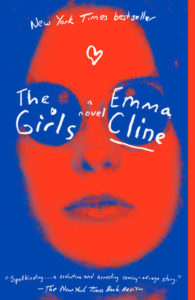Without getting all ‘My Favorite Murder’ about it, I do love a good cult. Extreme religion—aspects of a belief system (or in some cases an entirely new belief system) taken to a fanatical, often troubling degree, makes for a fascinating read, whether it be found in real life cases or the pages of a thriller.
Note that I am not critiquing religion itself here, but the manipulation of it: a person or persons perverting religion to an extreme level, often for their own gains, and often (certainly in fiction) with chilling consequences. The imbalance of power, the unwavering demands, the sometimes bizarre or even cruel punishments…it is all ripe to be looked at under a microscope, picked apart by an author’s keen eye.
In my debut thriller, A Girl Named Anna, the subplot underpinning Anna and Rosie’s search for the truth is the slow unearthing of The Lillies, a pseudo religious group which holds purity and cleanliness as central tenants to their belief – and does not take the transgression of these tenants lightly.
Whether it draws in followers with an alluring but dangerous leader, or hangs heavy over a family home, the threat of punishment around every corner, extreme religion has a chilling place in suspense fiction and psychological thrillers. Here are a few of my favorite reads in this them:

Carrie, by Stephen King
Stephen King’s first published novel was a big influence on A Girl Named Anna —I even reference the book, when school bullies place a bucket of blood in Anna’s locker with a note referring to her as “Carrie.” Carrie’s mother, Margaret White, rules over her teenage daughter with an iron fist, striking fear into her heart should she do something deemed “unproper.” Religion is the scapegoat here, and also the punishment: the words ‘go to your closet and pray’ haven’t stopped echoing in my mind since that unsettling first read.

The Virgin Suicides, by Jeffrey Eugenides
There is a sultry sexuality that pervades Jeffrey Eugenides’ dreamy psychological thriller, contrasting with, and railing against, the claustrophobic Catholicism practiced by the Lisbon girls’ strict mother. Like in Carrie, religion becomes a punishment for the Lisbon sisters: it is forced upon them, restricting their burgeoning adulthood, to such a degree that they feel there is no way out but their titular unhappy end.

The Girl in the Red Coat, by Kate Hammer
Kate Hammer’s gripping mystery revolves around the case of an abducted child: eight-year-old Carmel is bundled into a car by a man purporting to be her grandfather. Told from the dual perspectives of Carmel’s mother, Beth, and Carmel herself, the slow reveal of Carmel’s abductor, “Gramps” as an American preacher linked to a bizarre healing cult is a page-turning mystery, as well as a heart-wrenching tale of grief and loss.

The Girls, by Emma Cline
In The Girl in the Red Coat, young Carmel is forced into her abductor’s curious cult, but Emma Cline’s The Girls, narrator Evie is lured into one, compelled to join the Charles-Manson-inspired cult by the promise of sex, drugs and the Summer of Love. Told with the benefit of hindsight, Evie’s story is a compelling morality tale about the seductive power of extreme beliefs in the hands of an enigmatic leader.

Children of Paradise, by Fred D’Aguiar
Also inspired by reality, Fred D’Aguiar’s mesmerizing psychological thriller turns to the People’s Temple for inspiration. In a South American commune, a young girl is singled out by the cult’s omnipotent leader, leading the girl’s mother, Joyce, to call her faith and everything she has known into question. A thrilling re-imagining of the horrific Jonestown massacre, Children of Paradise examines the tragic consequences of obsession and religious fanaticism.

















